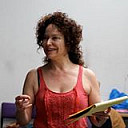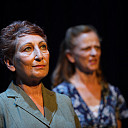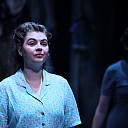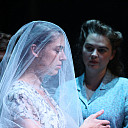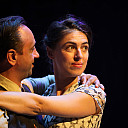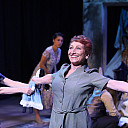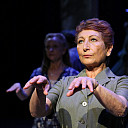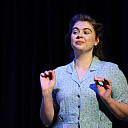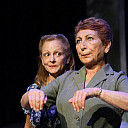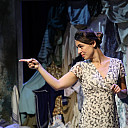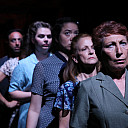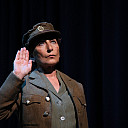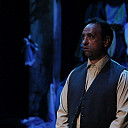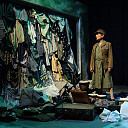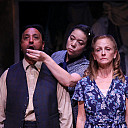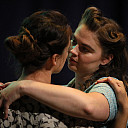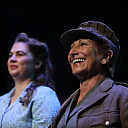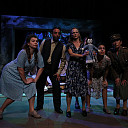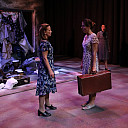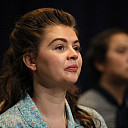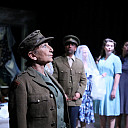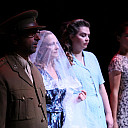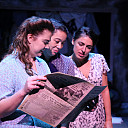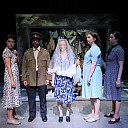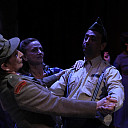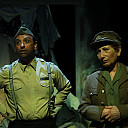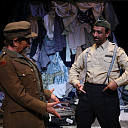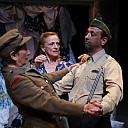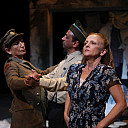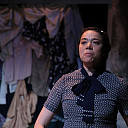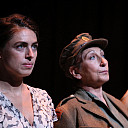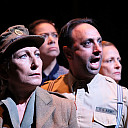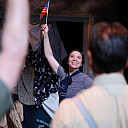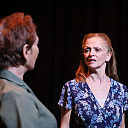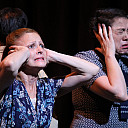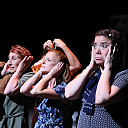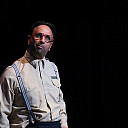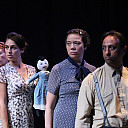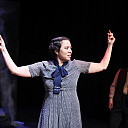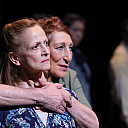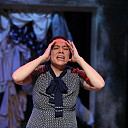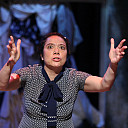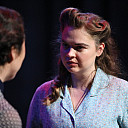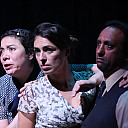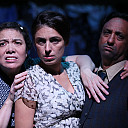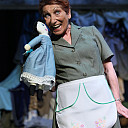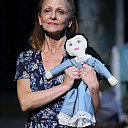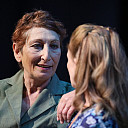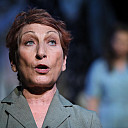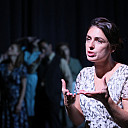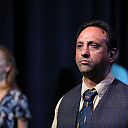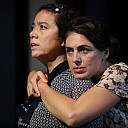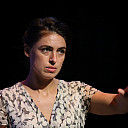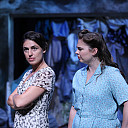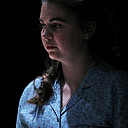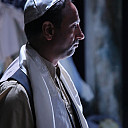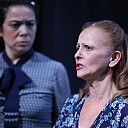Three Sisters
By Julia Pascal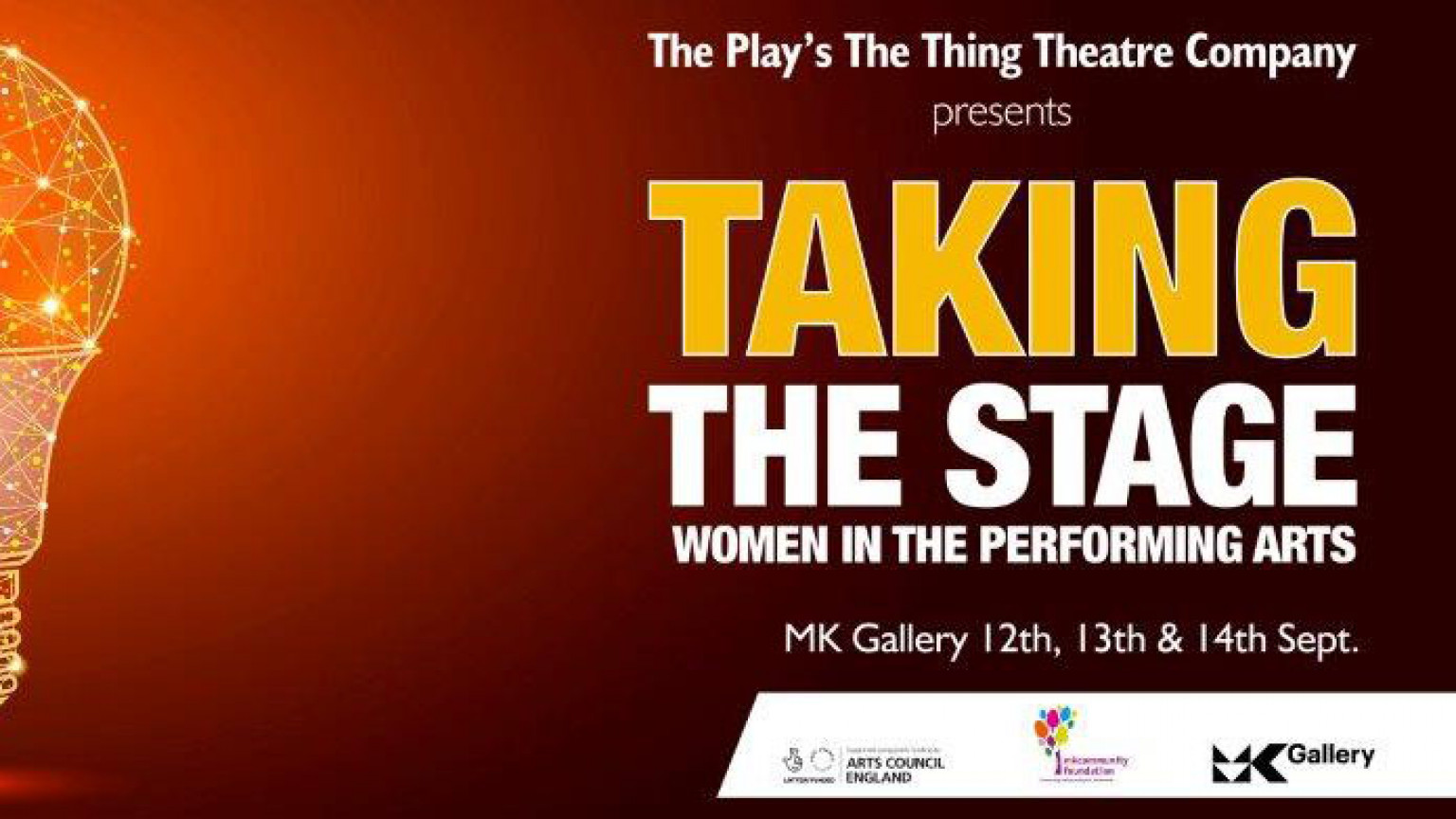
Three Sisters is a new play by acclaimed writer and director Julia Pascal, and was recently the opening production at the inspirational Taking The Stage Festival at MK Gallery, produced by Rosemary Hill and The Plays The Thing Theatre Company.
"Based on the real life events of Pascal’s own family history, this ensemble piece has moments of beauty, humour and trauma. The three sisters of the title are Edith, Isabel and Pearl, each growing up in “dreary” Manchester after their parents flee rising antisemitism in Romania in 1908. Their headstrong mother Esther fights for her daughters to have everything she did not, including a fulfilling and diverse education, much to their father’s chagrin.
As the piece unfolds we watch these intelligent, engaging young women navigate their lives. Edith becomes the army’s first munitions officer during World War Two. Pearl marries a G.I and moves to America – the land of opportunity. Isabel wants to marry, and eventually becomes a doctor’s wife.
Each woman recounts pertinent and important moments from their past, as they reflect on their lives, from childhood to death. Stylistically, the piece moves erratically through time allowing the sisters stories to intertwine at times, and become the focus at others. There is a sense of surrealism throughout which allows for some humorous and neatly layered moments of theatricality.
There is some truly beautiful text here and Pascal’s writing style is engaging and unexpected. Isabel’s monologue about a romantic meeting with a man abroad is dreamlike and fascinating. The characters’ personalities are intricately realised, and the disjointed structure of the piece makes for a pacey and intriguing performance. Pascal has a wonderful ability to transport you fully into a moment of time, even briefly.
In such an ensemble heavy piece, it’s important the cast gel together and it’s clear this is the case on the whole. Each performer brings something to the group. The whole ensemble works incredibly hard, but I must mention In particular Fiz Marcus, who is incredibly engaging on stage as the strong-minded Edith and gives a secure and grounded performance. Likewise, Saria Steel has a wonderful fiery and charming presence as Esther. Tarin Aakel plays several male characters and each with distinct characterisation – his transformation from strict Jewish father to weedy soldier Cecil is particularly amusing and well done.
There’s also some lovely puppetry work with a doll repeated throughout, and some simple but effective vocal work to complement scenes. Additionally there is another beautiful set from Kevin Jenkins here (as always!) with clothing and cloth almost overwhelming the characters as they root through dresses and wedding veils. This is complemented beautifully by several suitcases, shadowing the immigrant experience.
There’s lots to love here and you can’t help but develop real affection towards these characters, as if they are somewhat irksome but ultimately real members of your own family. It was an excellent choice for the opening of an inspirational festival celebrating women and I’m sure it has an exciting future ahead of it."
Carly Halse (Actor, Director and Theatre Practitioner)
Review: 'Three Sisters'
If you have any love for theatre and the arts, then you can look to The Plays the Thing Theatre Company as a kind of regional handbook. The company produces work that is tirelessly relevant, richly diverse and painfully effective when holding up the mirror to our darker social history. Following the company's choices in performance are a kind of fascinating dance between classic plays and new drama, with never a misstep when it comes to delivering a razor-sharp take on a script.
True to form then, we find The Play's the Thing at the heart of Taking The Stage, a three-day event which explores and celebrates the role of women in performing arts. Sadly, I wasn't able to attend anywhere near the number of debates, talks and performances I would have liked, but comments following Taking the Stage show that the festival was highly regarded and valued; a step forward in the global drive to finally give recognition and unreserved creative control to women practitioners and performers. It's a look back, too, to the painful journey which led here - but more on that later.
One of the jewels in the crown of Taking The Stage must be Three Sisters, a new play by Julia Pascal. Produced by Rosemary Hill and Directed by Julia Pascal
A member of the audience commented after the performance that the play had ‘that modern style’ which they attributed to the less naturalistic elements of the piece. However, while ‘Three Sisters’ is most definitely fresh and contemporary, it expertly uses theatrical devices from drama’s earliest forms – combining chorus and group physicality, rhythm and song to make the unfolding play both intelligent but also visceral; human, yet didactic.
Pascal interweaves the story of the titular sisters with history and powerful commentary on patriarchy, identity and immigration. Aside from the astonishing structure and symbolism in the script, its major genius is that it portrays genuinely moving and human histories alongside potent cultural issues – it labours neither but does justice to both and is unapologetic in doing so. It’s highly exciting to feel the raw impact of powerful writing and performance on an audience, and Three Sisters did just that.
This is where the director’s role is such a key one, and Julia Pascal triumphs for The Play’s The Thing. The stage is alive in every second, whether depicting the whirl of the women’s lives or the pathos in moments of reflection or quiet agony. Performers are given full command of the acting space, creating shapes and a physical flow which are visually exciting and accentuate character. Vocally, the choices made for the performance are also superb with brittle silences counterbalanced with rhythmic speech, harmonised singing and more impassioned moments which make the play feel, at times, like a desperate and heartfelt cry to be heard. Or a demand for change. Another of the company’s gifts is the ability to absolutely convey the context of a play with subtlety. Once again, in Three Sisters script and direction create the social context of the play effortlessly, with casual flourishes of narrative, traditional music, accent and costume. It’s artistry of an extraordinary standard.
Costume is used cleverly throughout the performance to explore the theme of identity; the use of uniform by Edith to find relevance in a masculine world and a masculine war, the veil of marriage which weighs so heavily on the shoulders of women is echoed later in the shroud at the end of the play. Having clothes make up part of the set is another of The Play’s The Thing’s strengths – intelligence and creativity in design which compliments a key theme in the performance; in this case the construction of lives around masks and roles embodied by clothing. The performers build the worlds of the Sisters and their family so effectively in, among and against a tapestry of garments.
And on the subject of the performer: this was a talented, cohesive and experienced cast. The impression I was left with at the end of the play was that it could (unwisely) have been at least half as long again; instead, the cast’s energy and skill created a perfect pace for the unfolding plot. There were so many layers created in the performance that even gentler moments were a trove of expression and communication. And Three Sisters was like this throughout – almost cinematic, in that on second or third viewings, the audience would notice details they had missed before. Humour, nuanced delivery of speech, interactions with props (such as the highly symbolic doll; simultaneously a reference to childhood and the puppetry of women by men as well as a point of comedy) – the cast created a vibrant and unforgettable performance.
Technically, Three Sisters was in keeping with the production as a whole; sophisticated yet understated, there were masterful decision made throughout. Sound design oozed with cultural history at the right moments for full impact, lighting changed in subtle ways to compliment the action (such as the red tones used with rich symbolism during wedding scenes, for example) and the functional set was a design success as is typical of The Play’s The Thing.
The venue was, I think, perfect for Three Sisters too. The black-box setting added to a sense of intimate claustrophobia which served the sisters’ social/cultural oppressions perfectly. For a play which highlights the lack of female choice and voice in the world, I thought it was interesting to see a female BSL interpreter communicating silently from the edges of the performance. Of course, the motivation here was inclusion, but before waving this away as over-analysis, it was an interesting, unintentional symbol!
The deaths of the protagonists at the end of the play were not the tragedies they might seem. Yes, it was performed exquisitely, with the shrouds covering the actors in one final, unifying costume or mask, the end of identity. It was a moment to reflect on the lives of women who, limited and brutalised by patriarchy, will never have the chance to realise their ambitions or be fulfilled. However, and for that very reason, this end is a beginning. It’s a note of hope for what’s to come.
In many ways, I have no right to reflect on the impact of ‘Three Sisters’ and the Taking The Stage festival as my opinions draw from a privileged viewpoint beyond the struggle for equality itself, based on the progress made by women to achieve a more enlightened world both in and beyond the arts. So I will not say that I look forward to Taking The Stage becoming a regular platform for change as there should not be the need for such a platform. Instead, having seen Three Sisters I look forward to a repeat of the festival as a celebration of the female writers, performers and practitioners who already keep theatre alive. At a time when the Arts are under threat, limited in education, funding and value, it’s fitting that women lead us forward; who else has such a personal knowledge of the damage being marginalised can do to a healthy world?
As Three Sisters shows, for women who create such outstanding theatre, the stage need no longer be taken; it was already theirs.
Nik Larcombe
Very good. Versatile. Thought provoking. So well acted. Unusual way of reflecting the complex story line.
Really great energy, physicality, storytelling. Liked the fact that the mother and sisters stayed as constant characters and the man and chorus members played other parts.
I really enjoyed it and was very impressed by the versatility of the cast in getting the story across.
Extraordinary.
Brilliant and moving.
Intriguing and engaging.
Provocative, engaging and loved the movement. The tight production, the singing, simple evocative set. Addressing refugee generational issues.
A superb play, beautifully written and realised. The ensemble playing was pitch perfect and very moving.
Three Sisters
